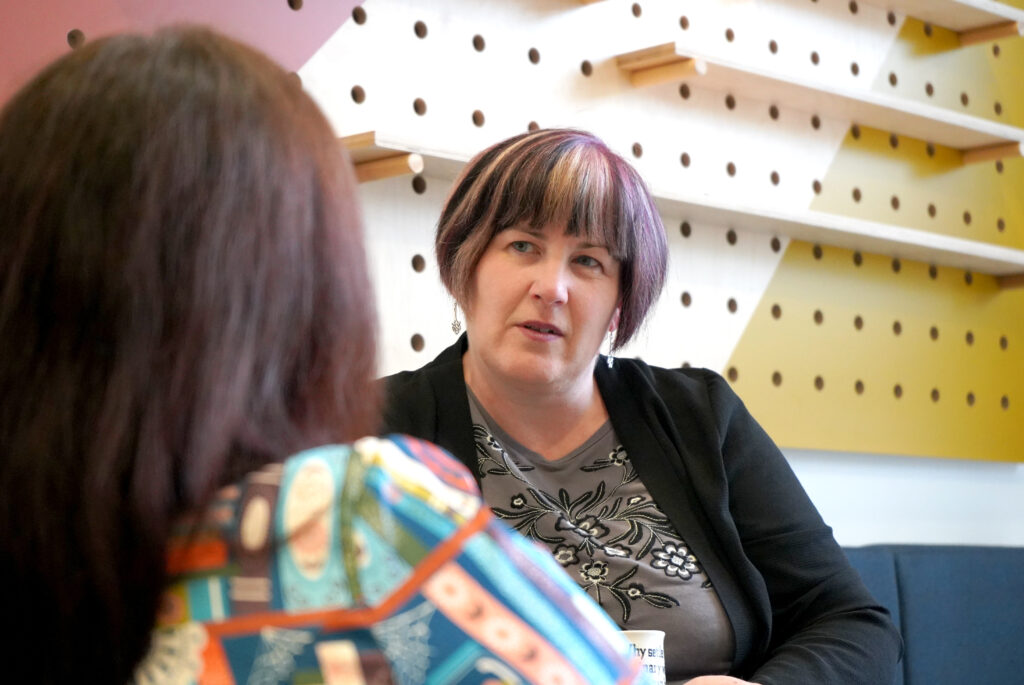Purplemoon Monthly Musing
Posted 26th November 2025
Getting to the Heart of It-Part 2- Congruence Yes, Collusion No.- a Purplemoon Monthly Musing

Welcome to Purplemoon Monthly Musings.
On the final Wednesday of every month Jenny will be posting out about a theme that has been appearing in her work, or her life, across all sectors. It could be a topic that particularly resonates with you, or it might be a new concept or idea to you. Either way the aim is to give voice to some thoughts, ponder some questions and explore what this might mean to us as individuals and as a community. Jenny will always aim to credit original sources as she explores the musings title and will welcome your comments and contributions to keep the musing going! This blog is also published on LinkedIn. Follow Jenny here.
Welcome to part two of the ‘Getting to the heart of it’ trilogy. Some of you may have noticed that the purplemoon monthly musing inadvertently took a break in October! It wasn’t intentional, it is that I found part two tricky to coalesce.
This is because congruence is difficult at times, and collusion can really turn up unintentionally when you are deeply relational and humanistic in your supervision, and creating psychological safety is of paramount importance.


What I do know is supervision is one of the most powerful spaces in leadership. It’s where we pause, reflect, and recalibrate. For education leaders, it’s a lifeline, a chance to process complexity and find clarity. To explore and reflect on self as well as others. For supervisors, it’s a responsibility, a commitment to hold space that is safe, honest, growth-oriented with a wellbeing lens. But within this dynamic, a subtle tension often arises: the pull between congruence and collusion.
Congruence is about alignment. It’s when our values, words, and actions harmonise. In supervision, congruence means showing up authentically—whether you’re the one offering guidance or the one receiving it. It’s about integrity: saying what you mean, meaning what you say, and acting in ways that reflect your principles. Congruence builds trust and therefore a psychologically safe space. It creates a foundation where real learning and wellbeing can flourish.
Collusion, on the other hand, is the quiet compromise. It’s the nod of agreement when your gut says, This needs exploring. It’s the temptation to avoid discomfort for the sake of harmony. Collusion can feel like kindness, but it’s not. It’s avoidance dressed up as empathy. And while it may soothe in the short term, it erodes growth in the long term.
So how does this show up in supervision?
For supervisors, the risk of collusion often comes when a supervisee shares something that feels ethically grey or professionally concerning. You might think, I don’t want to damage trust, and choose silence. But trust isn’t built on avoidance—it’s built on honesty delivered with care. Congruence means naming what you notice: I hear your perspective, and I wonder if we can explore the implications together. It’s not about confrontation; it’s about curiosity and courage.
For education leaders, collusion can look like self-protection. You might hold back in supervision because admitting uncertainty feels risky. You might agree with suggestions, ideas or comments you don’t believe in because challenging feels uncomfortable. But supervision is not a performance—it’s a partnership. Congruence means bringing your whole self into the conversation: your doubts, your questions, your convictions. It’s about trusting that growth comes through honesty, not through pretending.
Here’s the truth: congruence is hard. It asks us to be clear about our values and brave enough to live them out. It asks supervisors to balance support with challenge, and supervisees to embrace vulnerability without fear. But when both sides commit to congruence, supervision becomes transformative.
What does this look like in practice?
- For supervisors:
- Hold boundaries with compassion. Empathise without excusing.
- Name what you notice. Sometimes the most supportive act is surfacing what’s unsaid: I sense some tension—shall we explore that?
- Stay anchored in purpose. Supervision is not about pleasing; it’s about partnering for growth.
- For supervisees:
- Bring your authentic self. Share the wins and the worries.
- Ask for challenge as well as support. Growth rarely happens in comfort zones.
- Reflect on alignment. Where do your actions match your values—and where do they drift?

Both roles require courage and compassion. Courage to speak truth, even when silence feels safer. Compassion to hold differences without judgement. When these qualities meet, supervision becomes a space of integrity—a place where leaders are not just managed but mentored, not just supported but strengthened.
So here’s the invitation for this month:
- If you supervise, notice where collusion tempts you. Where do you soften truths or avoid challenge? What would congruence look like instead?
- If you are supervised, notice where you hold back. Where do you agree for ease rather than honesty? What would it mean to show up whole?
Because getting to the heart of it is not about perfection. It’s about presence—anchored, authentic, and willing to walk the harder path for the sake of growth. Congruence calls us to alignment, even when it’s uncomfortable. Collusion tempts us with ease, but it costs us trust—and ultimately, wellbeing.

Comment section